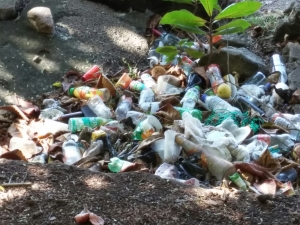This is the third blog this week I have done on plastic. If this doesn’t cause you to reduce plastic use, nothing will. Plastic is harmful to wildlife, but it is also ending up in our food. Make reduction of plastic-use a daily habit.

Photo: Shutterstock
“The horrifying impact of plastic pollution on marine life is well documented. Greenpeace found that plastic pollution in the ocean has negatively affected at least 267 species worldwide, including 86 percent of all sea turtle species, 44 percent of all seabird species and 43 percent of all marine mammal species. Large pieces of plastic floating in the ocean are easily mistaken for food by seabirds, whales, dolphins and turtles. When plastic is ingested by these animals, it blocks their digestive tracts and gets lodged in their windpipes, cutting off or filling their stomach, which results in malnutrition, starvation and death. It also causes fatalities due to infection, drowning and entanglement.” Earth911. Read the entire article here
Simple ways to reduce your plastic pollution:

- Start simple and add one idea at a time
- Bring your own shopping bags
- Buy bulk and refill your own containers
- Don’t purchase bottled water
- Say “No” to straws, plastic spoons, forks, and knives
- Always choose glass containers over plastic!
- Never purchase Styrofoam (Be aware of meat and produce trays)








